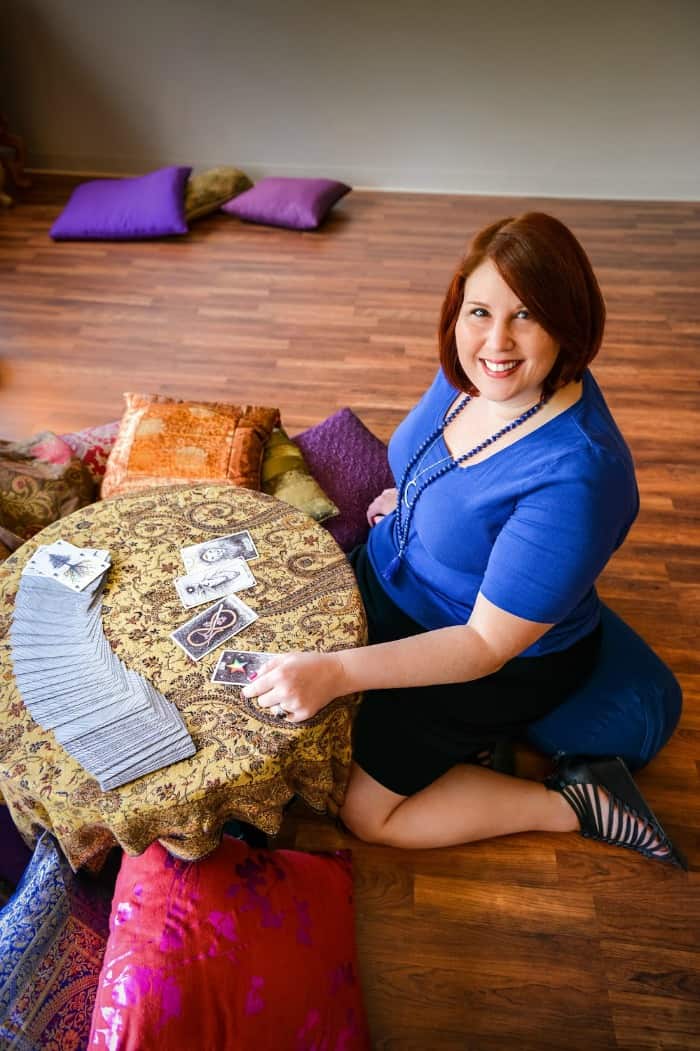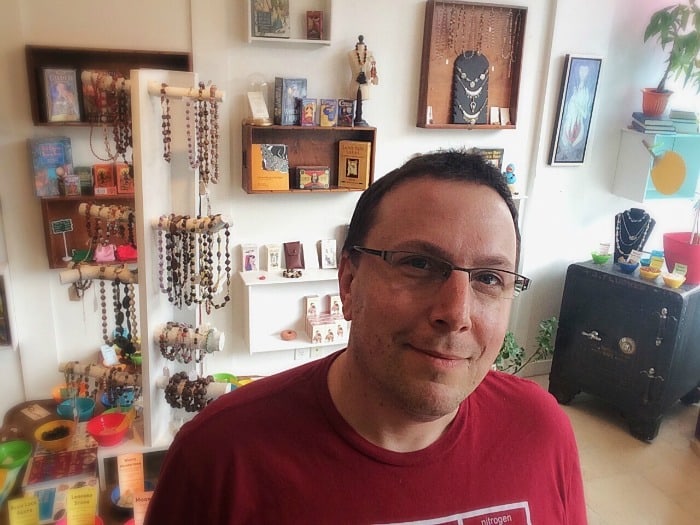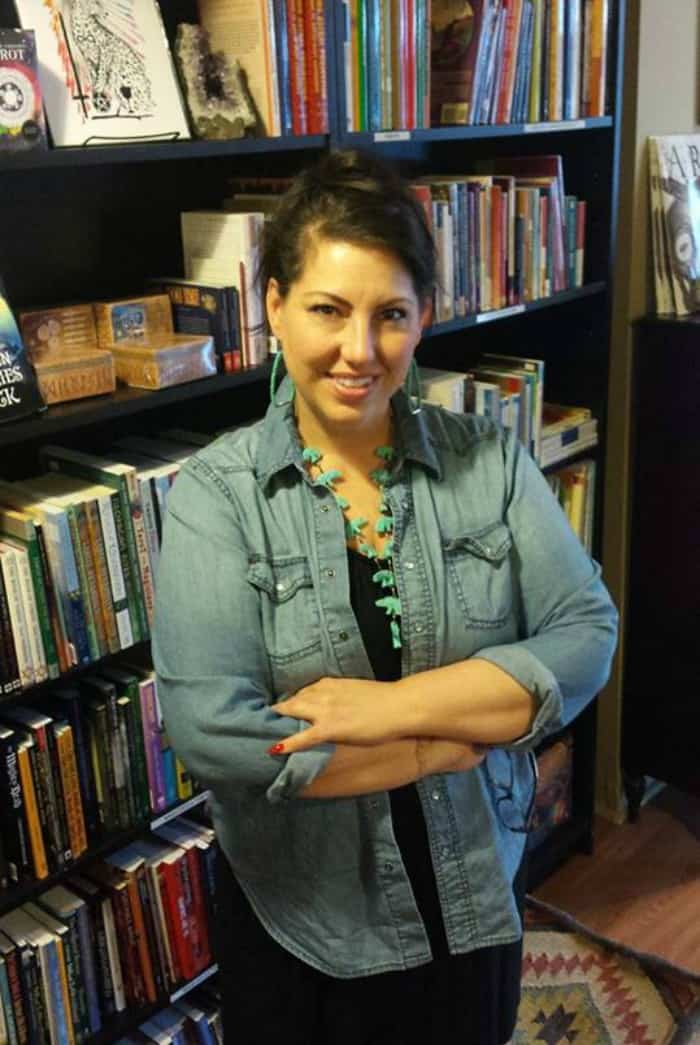
Even though you may be working in a spiritual industry, don’t assume that you’re going to be surrounded by love and light all time. In fact, this work can – and does – attract a fair share of jerks and unstable people just like any other business.
Clients overstep boundaries, act inappropriate, get angry, and, in rare cases, they can be violent.
Which means you need to protect your business and your self when and if a situation arises where you feel uncomfortable or threatened.
I’ve written before on safety. But recently, after two very icky situations, I had to tighten up my own policies further for in-person sessions. Instead of allowing new people in with a referral as I’ve done in the past, all new clients must have their first session with me over the phone.
Why?
Because this will add an additional level of screening. I can assess if the client is problematic, hostile, or a pain in the ass. That information will allow me to refuse service in the future. (Plus, it also gives the client a chance to see if they like my style – they get to vet me too!)
As my business continues to evolve, so may this policy. As should yours.
While my rules ‘n regulations may work for a home office, what about if you have an office away from your home? What then? How about if you are running a metaphysical shop? Or if you have employees? What is the smartest legal move to make if someone goes ballistic in your shop or office?
I decided to reach out to a few metaphysical professionals that I respect and trust to get some answers – and this may give you, my lovely readers, some good ideas on what you may want to consider if you work in any of those sort of locations.
My interviewees are: Jenna Matlin of Queen of Wands Tarot, who runs a successful tarot business in Philadelphia and has an office outside of her home; Andrew McGregor, owner of The Hermit’s Lamp in Toronto; Heatherleigh Navarre, proprietress of The Boston Tea Room in Ferndale, Michigan; and Benebell Wen, attorney and author of Holistic Tarot.
Listen in to what these experts had to say:
Jenna Matlin of Queen of Wands Tarot

What sort of general safety practices do you recommend for mystical entrepreneurs who work in an office outside the home?
Jenna: I chose to rent a reading room for myself because I wanted to create a special neutral space for myself and my clients that I knew I would be unable to create successfully in my own home as I see a lot of in person clients. I think the first thing that many practitioners need to think about is safety when they are choosing an office space; sometimes it can be a last consideration or a consideration only after something has happened. Here are some things to keep in mind when choosing a space:
Because I often work late evenings I wanted to make sure that my office space was well lit at night with clear walking paths to the parking lot as well as well populated most of the time by other businesses who share the building with me. I also have cultivated a good relationship with the other business owners, we all look out and know one another within this small community in the building, we know each other’s cars and when it’s late we do keep an eye out for one another so choosing a space within a community of businesses who are friendly and engaged can also be important.
Signage is also a consideration. I intentionally have no outside signage of my business because I actively discourage walk-in appointments or random from the street appointments. Getting to my office is a true intentional act that takes many steps. I have a high bar for entry that seems to select out most potential problems before they start.
Locks are important, too. I have an automatic locking system on my main door into my waiting room that locks itself at 8pm (it locks usually as I am seeing my last client) which I can program and reprogram to my needs. I also have another door which locks into my reading room area which I always keep locked while I am in my own reading room so there are two doors to even get to me; again the bar is high to find me, the only people who are in my waiting room and reading room are the only people who have any business being in my office, anyone else would have a hard time actually accessing me physically.
Lastly, even though I do work alone in my own office, I am not the only one who knows my schedule. My partner has access to my calendar which includes the name, email address, and phone number of every client I see and when. This is the one small concession I made for total privacy for my clients as a safety measure. My partner and I have an agreement, if I do not come home or call after an allotted time in the evening and after ringing my phone, and, if he cannot reach me his next step is to call the client. After that, the police. We have never had to use this option but it is in place, just in case. So my last recommendation is to have a safety plan established with someone you trust.
Have you ever dealt with someone who acted inappropriately or threatening? If so, how did you deal with it?
Jenna: I have been extremely fortunate to never have to deal with a threatening situation in my office, I think it is because I have a high bar for entry, no walk-ins, appointments made ahead of time and with credit card capture for each one; it is very clear for everyone who comes in that I have their legal name and credit card information before they even see me – this seems to keep everyone on their best behavior. The only strange behavior I had was once reading for a client whose boyfriend was waiting for her in the waiting room, I could hear him knocking around as if he was looking for something. In the reading we talked about his addiction issues so I put two and two together – he was looking for valuables while we were in the reading! Since there is nothing of value in the waiting room (or my reading room I do not keep cash there), his search was in vain but I did ask him what he was doing in the room while we were busy!
What is your best advice for screening people before they come in for an appointment?
Jenna: I do not screen clients over and above the process I outlined above. People make appointments online with me and the process has several steps, must be made in advance, and requires a credit card to book. This kind of system automatically seems to weed out a lot of issues, especially the credit card piece. People don’t want to stir up trouble knowing that I have that kind of personal information on file. I also charge high enough that the people who come to see me are usually very serious and very earnest about spending time with me and with tarot. I notice that people often have issues when they are charging too low and are attracting clients who do not value them as much as they should.
Andrew McGregor of The Hermit’s Lamp

Andrew: Prologue. In talking about boundaries and safety around working with the public I want to use real examples because it is easy to get lost in theory. Please, as you read on understand, I have deep compassion for every one of these people. I do not think they should be mocked, shamed, or ridiculed. However, their behaviours were all deal-breakers for me.
When you run a metaphysical store, basically anyone can come in the door at any time. What safety measures should a brick-and-mortar business have in place?
Andrew: The biggest asset is your intuition. If something feels off it probably is. Even if you are wrong, it is better to be safe than sorry when it comes to your safety. If Oprah herself walks into your place and you get a weird feeling about her – listen to your intuition.
In general you want to make sure you limit your vulnerability to people who will take advantage of you or be dangerous in some way. Don’t let people into spaces that are private or unmonitored no matter the reason. Do not share your personal information with clients. Avoid being alone with them if you can. Keep your cell phone handy. Keep the door locked when you aren’t open. Consider installing a video security system even if it only monitors who is coming and going. All of these practical approaches can help limit the risk of trouble.
Don’t forget your spiritual allies if you work that way too. I am regularly checking in with my guides and guardians on what the space might need both spiritually and practically. I also work hard to keep the space clean energetically by clearing it on a regular basis. Negative attracts negative, so keeping your space shining will be less attractive negative people and energy.
What is the best course of action if a client gets out of hand?
Andrew: When I was doing martial arts my instructor used to say that ending the fight quickly was the most important thing. If the fight went on for more than 30 seconds, even if you won, you’d still be so beat up you’d feel like you lost. This is really true of any confrontation or problem. The minute it starts to get out of hand you should end it. The longer you stay in the fray the harder it is to stay clear and the more emotionally damaging it is. In the context of working with people I take ending it to mean they are out of the space and know clearly that it is over.
I read for a woman many years ago; we talked about her abusive husband and how to start to find a way out of her relationship. She agreed and talked about how he beat her and how afraid she was. When the reading was done she shifted gears and told me I was wrong about why this was happening. That in fact demons were possessing him and making him do this. Though there are cards that might talk of spiritual problems of this kind, none had shown up in the reading. She really wanted to talk about this, but our time was up. She expressed her deep disappointment and continued to want to talk about it. I offered the woman her money back and asked her to leave, saying clearly, “I hear your disappointment, but cannot continue this conversation or help you further.”
Back when I had a home office, I arrived one day to find a client waiting on the steps. No appointment-they just came to wait until they saw me. They’d been there two hours before I pulled in with my family in the car. I told my partner to call 911 if they did not leave immediately and got out to talk to them. Right away they started into their excuses for being inappropriate. Every time they tried to speak I just said “Leave now and never come back,” another level louder than the previous time. They quickly got the point and left.
Another time I had a person start asking to know how many people their ex was sleeping with. I told them I wasn’t willing to answer that for them (already thinking about asking them to go). Their response sealed it though. “I paid you, so you work for me. You have to do what I say.” Which really did’t fly with me so I politely told them they had to leave and handed them their money back. They continued to try to coerce me into reading for them with every step to the front door. I didn’t argue I just kept walking knowing they’d follow me in order to continue to argue. Once at the door I ended it by saying “Don’t ever come here again. I will not read for you. If I see you on the street, don’t talk to me. I will not even acknowledge that I know you.” At which point I closed the door.
Being unequivocal isn’t always easy, but it is the best route. Any softness or maybes only keep things going. Avoiding being firm out of fear that it will escalate things never solves the problem. If they are going to escalate it will happen no matter what you do.
What boundaries might prevent problems in the first place?
Andrew: The biggest thing you can do though is adjust your attitude. If you are running a shop or just seeing people in person as a reader or healer you have to be willing to own what isn’t ok for you. It is great to be compassionate and non-judgemental but that doesn’t mean you should put up with anything. There are lots of different kinds of problems with which people might walk through the door. All of these people will try to tell you that they are normal, safe, or excused for some reason. In short most problem people will try to convince you that you are being unreasonable.
Like the woman with some kind of drug problem who dropped and shattered her glass pipe on the floor of the shop who said “Its okay I’ll clean it up.” I said to her it was neither was it okay nor was her help required.
Or the new chap who came in to see me for a reading about some legal issues. Near the end of the reading his coat opened to reveal his gun. At the end of our time I told him that he made me uncomfortable and that interfered with my ability to read so I would not see him again.
Or the mentally unwell person who thought they were enlightened and wanted me to listen for free to their delusions of being a wise guru. I listened to him and walked him out the door. The next time he was by I saw him coming and met him at the door saying he wasn’t welcome. Being consistent with problem clients is crucial.
Spirituality can be used to prevent issues not just clean them up. Keeping yourself emotionally and energetically clean also helps avoid problems. When you aren’t caught in your own scripts and patterns it is harder for people to con you or manipulate you. When your energy is strong it is easier to feel people encroaching on it. A solid spiritual practice like meditation, energy work, or ancestral devotion can help prevent empathic overwhelm, vampiric draining, or just simply taking on the bad vibe of some person who is suffering.
Finally, don’t be flattered. I’ve had a number of people fall in love with me over the years. In day-to-life knowing someone has a crush on me is fun. Who doesn’t like a little ego boost from time to time. At work the minute someone acts inappropriate it is best to stop working with them. I had one client say “I know you are married, but I could make you happier and no one needs to know.” Talk about a conversation ender. No doubt everyone reading this is just wonderful, sexy, and a genius, but the more insistently a client wants to tell you that, the less you may want to choose to listen.
Be clear, be unafraid, and don’t put up with things that don’t make you happy and you’ll also be safer.
Heatherleigh Navarre of The Boston Tea Room

What sort of safety practices and policies should a metaphysical shop owner have to protect their staff?
Heatherleigh: The first and most important policy is to have your local police department non-emergency number posted next to the shop phone, and train every member of the staff on what situations merit a call to the authorities, as well as how to verbally respond to harassing or abusive behavior from patrons. Everyone knows to call 911 in an emergency, but I am amazed at how often some truly questionable behaviors by people in the store were NOT seen as a threat by some of my staff. Female staffers, in particular, seemed very reluctant to tell a customer to stop a certain behavior, let alone to call the police, even when the person was clearly being abusive – yelling, threatening, making overt sexual comments, etc. It seems we’ve been trained, as women, to be too nice, to try and calm things down on our own; frankly, I think we’ve been trained to expect and to tolerate behaviors which are at best exceedingly rude, and at worst, downright dangerous. Training your staff to respond to such behavior with forceful language immediately and to call on the assistance of police when appropriate, is the necessary first step in protecting everyone. Our local police department has about a two to three minute response time, since we are just two blocks from their precinct, and they have always been great about showing up and providing us support, whether the issue is a drunk who gets loud and unruly, a shoplifter, or someone sketchy hanging out too close to closing time, when we are about to lock up and head to our cars and are concerned about security
If a client becomes a problem and the reader doesn’t want to work with them any longer, how might you recommend handling it?
Heatherleigh: While I think there are many valid reasons to discontinue working with a client, I think it’s vital that the Reader identify what he or she defines as a “problem”. In our shop, which serves a client base of thousands, and which often has several dozen walk-in clients every day, it’s not practical to vet all new clients, nor is it an environment conducive to cultivating a “curated” client list. For this reason, I suggest that Readers find strategies for working more effectively with clients who have challenging tendencies, rather than simply declining to serve them. For instance, if a client comes in frequently, always wants to discuss the same situation, and yet never seems to take any actions to change the situation, I will assign that client “homework”, suggesting a positive action, and will then firmly inform them that I will not book another session with them, until they have done that homework.
If, however, the problem is a genuine security issue – the client has used abusive language, has displayed violent tendencies, has shown an inappropriate romantic or sexual attraction to the Reader, is clearly suffering from any kind of untreated mental illness, is under the influence of drugs or alcohol, among other reasons, then I fully support that Reader making the determination to decline serving them. If it’s the client’s first visit when this happens, the Reader can simply excuse themselves at any point in the session, come and get assistance from a manager, and we will ask the client to leave. In those instances where the Reader has been seeing the client for a number of sessions, I believe it is important that the Reader tell the client personally that they need to stop working together, and whenever appropriate, I encourage them to be honest about their reasons, unless they believe that to do so would put them in danger. Here are some of the reasons I have used:
“I can no longer work with you because I find your style of communication inappropriate.”
“You’ve come in so often lately that I am concerned you’re relying too heavily on me, and not enough on your own intuition and decision-making skills.”
“I’m convinced I cannot provide the type of service you are seeking. I am happy to refer you to someone who might be a better fit.”
“Your repeated comments about my appearance and your attraction gets in the way of a professional exchange between us, so I will no longer be able to work with you.”
Whenever appropriate, I offer to refer the client to someone else who would be an appropriate fit, either within my company, or outside it.
What if the client gets angry?
Heatherleigh: Speaking firmly, directly, and honestly seems to be very effective in a vast majority of these situations. In the rare case where the client decides to try and debate or argue, I simply stand my ground and repeat my clearly stated reason until they get tired of arguing, or until I feel like they are escalating, in which case I say something like “I’ve been as clear as I can be with you about my reasons, and now I have to ask you to leave.” If they remain, my next move is picking up the phone to call our lovely local po-po.
What boundaries might prevent problems in the first place?
Heatherleigh: I’m so glad you asked! I think that far too often, these situations are ones that could have been nipped in the bud if more Readers had clearly established professional boundaries in place in their practice from the get-go. Know what types of things are a “red-flag”, and act accordingly in order to avoid encouraging scary clients.
Drugs and alcohol are almost always a huge indication of problems to come, and many Readers will absolutely refuse to read for anyone under the influence. In our shop, we are a bit more lenient, because we do sometimes have that after-dinner crowd who come in after a couple of glasses of wine, and we will read for them, but whenever someone is too tipsy, believe me, we are paying close attention and are ready to act quickly if need be.
Be wary of clients who are overly friendly. A certain professional distance should be maintained at all times. Avoid telling clients too much about your personal life, as that erodes boundaries, and can be seen as an encouragement to get overly personal from their side. It also is seen as an invitation of friendship, and can lead to expectations of favors and special treatment.
If you suspect mental illness, don’t be afraid to ask the client if they are currently under the care of a therapist or mental health professional. I have found that most are more than willing to disclose this, and it can help you very quickly assess whether moving forward with a reading is appropriate.
If a client discloses a wish to harm themselves or others, I take that very seriously, and rather than try to minimize such disclosures, I ask for details. In these cases, our policy states: “If the client relates the intent to harm another person, and the Reader believes that such information is credible, the responsibility for confidentiality is invalidated by the potential threat of injury to the third party. The Reader can and should provide the information to management to decide whether to notify the appropriate authorities.”
In all cases, trust your gut. If something is telling you “This person is sketchy”, remember: that is tens of thousands of years of evolution talking to you and you should believe it. Better to lose out on the price of one session than to have to regret not having listened to your own instinct later.
Benebell Wen, attorney and author of Holistic Tarot

Let’s talk about preventative care. What might be the smartest way to avoid legal problems with clients in the first place?
Benebell: This is a difficult question to answer because of how broad it is. Generally, the best way to avoid legal issues is full disclosure; clear and unambiguous terms for payment before any services begin, and never change those terms of payment mid-service; make sure you have all licenses and permits that the laws require you to have to do the kind of business you’re doing; and never misrepresent your services or abilities.
What is the best course of legal action a metaphysical business owner should take if a client becomes threatening?
Benebell: This isn’t really a legal question, because if a client becomes threatening, you don’t need a lawyer in that moment—you need the police! So call 911! Then later, once you’re safe, you can talk about criminal charges and if you want to pursue civil action, then you’d consult a local lawyer.
What about disgruntled employees? How might a contract protect the business owner in the case of disgruntled, vengeful ex-employees?
Benebell: The labor laws of most states make distinctions between employees and independent contractors, so first, you’ll want to know which is applicable. For employees, every business owner should be familiar with the labor and employment laws of their jurisdiction. Usually the best form of protection is a clear, well-drafted employment contract that is in place before employment commenced (and therefore well before the dispute occurs). Having an employee handbook that covers company policies and procedures, including what to do in the event of a dispute, signed and acknowledged by every employee also helps to protect a business owner. The acknowledgement on the handbook should also indicate that the handbook is to be integrated as binding contractual terms along with the employment contract.
————-
I hope that this post gives you some good ideas on how to protect your business and your self from the cray-cray. Remember: safety policies are important but even more important is that you enforce them. Don’t be afraid to lay down your own law because you deserve to feel safe.
I think this is a dialogue that needs to be expanded further. I would love to hear your stories and solutions. Reach out to me on Twitter @thetarotlady and share your thoughts.
Blessings,
Theresa
@ Theresa Reed | The Tarot Lady 2016


 I’m Theresa Reed (aka, The Tarot Lady). I’ve been a full-time tarot reader for 30+ years — which, in my industry, makes me pretty badass.
I’m definitely not your average Tarot expert — I drop the F-bomb, I quote rappers, and I’m obsessed with pop culture + reality TV. Folks come to me for straight-talk + tough-love — without the woo-woo fluff.
I’m Theresa Reed (aka, The Tarot Lady). I’ve been a full-time tarot reader for 30+ years — which, in my industry, makes me pretty badass.
I’m definitely not your average Tarot expert — I drop the F-bomb, I quote rappers, and I’m obsessed with pop culture + reality TV. Folks come to me for straight-talk + tough-love — without the woo-woo fluff.
You must be logged in to post a comment.